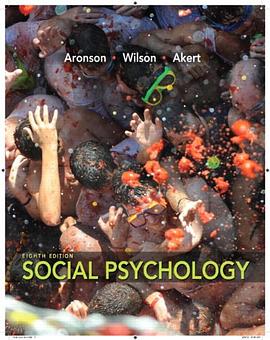Social Psychology
内容简介
Research made relevant through a storytelling approach. This renowned text maintains its acclaimed storytelling approach, teaching the science of psychology through an engaging narrative that makes research relevant to students. Drawing upon their extensive experience as researchers and teachers, Elliot Aronson, Tim Wilson, and Robin Akert present the classic research that has driven the field and introduce cutting-edge research that is the future of social psychology. Significantly updated to reflect advances in the discipline, the 8th edition provides a firm foundation for students to build their understanding of this rigorous science in a way that engages and fascinates. A better teaching and learning experience This program will provide a better teaching and learning experience- for you and your students. Here's how: *Personalize Learning - The new MyPsychLab delivers proven results in helping students succeed, provides engaging experiences that personalize learning, and comes from a trusted partner with educational expertise and a deep commitment to helping students and instructors achieve their goals. *Improve Critical Thinking - The authors emphasize this rigorous science through research examples that encourage students to think twice about their preconceived notions of what social psychology is - and isn't. *Engage Students - Through real-life vignettes, which open each story chapter, and "mini-stories" throughout each chapter, the eighth edition provokes student interest by focusing on real-life examples. *Explore Research - The authors present a balance between the latest findings in the field with classic research in social psychology. Noting that some older studies deserve their status as classics and are important cornerstones to the discipline, this text encourages students to experience the continuity and depth of the field versus regarding it as a collection of studies published in the past few years. *Support Instructors - This program provides instructors with unbeatable resources, including state-of-the-art PowerPoints embedded with videos, the NEW MyPsychLab with ABC's What Would You Do videos, an easy to use Instructor's Manual, a robust test bank, and an online test generator (MyTest). All of these materials may be packaged with the text upon request. Note: MyPsychLab does not come automatically packaged with this text. To purchase MyPsychLab, please visit www.mypsychlab.com or you can purchase a ValuePack of the text + MyPsychLab (at no additional cost). ValuePack ISBN-10: 020591201X / ValuePack ISBN-13: 9780205912018.
......(更多)
作者简介
Elliot Aronson
Elliot Aronson is one of the most renowned social psychologists in the world. In 2002 he was chosen as one of the 100 most eminent psychologists of the twentieth century. He is currently Professor Emeritus at the University of California at Santa Cruz and Distinguished Visiting Professor at Stanford University.
Dr. Aronson is the only person in the 110-year history of the American Psychological Association to have received all three of its major awards: for distinguished writing, distinguished teaching, and distinguished research. Many other professional societies have honored his research and teaching as well. These include: the American Association for the Advancement of Science, which gave him its highest honor, the Distinguished Scientific Research award; the American Council for the Advancement and Support of Education, which named him Professor of the Year of 1989; the Society for the Psychological Study of Social Issues, which awarded him the Gordon Allport prize for his contributions to the reduction of prejudice among racial and ethnic groups. In 1992, he was named a Fellow of the American Academy of Arts and Sciences. He has served as President of the Western Psychological Association as well as President of the Society of Personality and Social Psychology.
Tim Wilson
Tim Wilson did his undergraduate work at Williams College and Hampshire College and received his Ph.D. from the University of Michigan. Currently Sherrell J. Aston Professor of Psychology at the University of Virginia, he has published numerous articles in the areas of introspection, attitude change, self-knowledge, and affective forecasting, as well as the recent book, Strangers to Ourselves: Discovering the Adaptive Unconscious. His research has received the support of the National Science Foundation and the National Institute for Mental Health. He has been associate editor of the Journal of Personality and Social Psychology and a member of the Social and Groups Processes Review Committee at the National Institute of Mental Health. He has been elected twice to the Executive Board of the Society for Experimental Social Psychology and is a Fellow in the American Psychological Society. Wilson has taught the Introduction to Social Psychology course at the University of Virginia for more than twenty years. He was recently awarded an All University Outstanding Teaching Award.
Robin Akert
Robin Akert graduated summa cum laude from the University of California at Santa Cruz, where she majored in psychology and sociology. She received her Ph.D. in experimental social psychology from Princeton University. She is currently a professor of psychology at Wellesley College, where she was awarded the Pinanski Prize for Excellence in Teaching early in her career. She publishes primarily in the area of nonverbal communication and recently received the AAUW American Fellowship in support of her research. She has taught the social psychology course at Wellesley College every semester for over twenty years.
......(更多)
目录
Chapter 1 Introducing Social Psychology
Chapter 2 Methodology: How Social Psychologists Do Research
Chapter 3 Social Cognition: How We Think about the Social World
Chapter 4 Social Perception: How We Come to Understand Other People
Chapter 5 The Self: Understanding Ourselves in a Social Context
Chapter 6 The Need to Justify Our Actions
Chapter 7 Attitudes and Attitude Change: Influencing Thoughts and Feelings
Chapter 8 Conformity: Influencing Behavior
Chapter 9 Group Processes: Influence in Social Groups
Chapter 10 Interpersonal Attraction: From First Impressions to Close Relationships
Chapter 11 Prosocial Behavior: Why Do People Help?
Chapter 12 Aggression: Why Do We Hurt Other People? Can We Prevent It?
Chapter 13 Prejudice: Causes and Cures
Chapter 14 Social Psychology in Action 1: Making a Difference with Social Psychology: Attaining a Sustainable Future
Chapter 15 Social Psychology in Action 2: Social Psychology and Health
Chapter 16 Social Psychology in Action 3: Social Psychology and the Law
......(更多)






